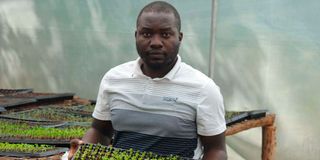The fruit seedling kings of Daraja Mbili, Kisumu

Caleb Nyamanga with some seedlings.
On the Kisumu-Busia highway near Daraja Mbili is where Luis Omondi has set up Japur Farm Solution, a consultancy centre.
There are hundreds of different kinds of seedlings in the small area that measures 50m by 20m.
Inside the black shed net are fruit tree seedlings, ornamental plants and indigenous trees.
The centre sells grafted apple, mango, orange, avocado, pawpaw, grape and many other seedlings.
There is an 8x15m greenhouse with black trays which have seedlings of Sukuma wiki, tomato, capsicum, spinach and other vegetables.
Caleb Nyamanga helps Omondi with the day-to-day activities at the centre.
“We started this business in February 2020, just before coronavirus landed in Kenya. The reason was to bridge the gap between access to quality seedlings and services,” Nyamanga says.
Daily activities at the centre include going through customer orders, watering plants, making deliveries for seedlings and grafting.
The business started in Kirinyaga County before the two opened another centre in Daraja Mbili, Kisumu County.
With just Sh7,000, Omondi leased a 20mx50m plot in Kirinyaga. He bought seeds, set up a nursery and fitted a mains water system.
“Many Kenyans looked for alternative means of generating income during the long Covid-19 lockdown. The demand for seedlings grew exponentially,” Omondi says.
He acquired a certificate to produce seedlings from the Kenya Plant Health Inspectorate Service (Kephis).
With access to Facebook and other social media platforms, it was easy to reach clients across the country.
It wasn’t long that Omondi realised the demand for seedlings was also high in Western Kenya.
“We would make deliveries to Western Kenya but the plants got damaged on the way. Setting up another outlet in Daraja Mbili addressed that challenge,” Omondi says.
The Daraja Mbili seedling centre mainly got planting material for mangoes, avocados and oranges from local markets.
Grafting begins once the root stock is established.
“We get fruit seeds from Kisian, Ojola, Kibuye and other markets but buy scions for grafting from certified producers,” he says.
Nyamanga and his team of five workers ensure the stock and scion are disease-free.
The scion forms the branches of the fruit tree while stock consists of roots and the trunk.
The workers cut the surface of the scion and stock, fit and bind them tightly with thread. It is then covered with a clear polythene tube to prevent bacterial and fungal infection. The process also helps maintain temperature and humidity for germination.
“We remove the polythene bag once the scion develops buds after four weeks. But this depends on the type of fruit and its growth rate,” he says.
Once the seedlings have sprouted and developed leaves they are placed in a shade to harden and await customers.
According to Kephis Plant Inspector Pamela Kibwange, some plants are better when it comes to picking rootstock.
“Choose suitable rootstock that produces uniform, vigorous seedlings which are compatible with other varieties,” she says.
“When selecting the scion for grafting, ensure it is clean, healthy and free from pests and diseases. Disinfect your hands and the knife to be used for cutting scions when joining to the rootstock.”
Grafted fruit prices range from Sh100 to Sh400.
Japur Farm Solution produces ornamental plants too. It gets repeat sales mainly through social media platforms and referrals.
Omondi and Nyamanga offer consultancy for landscaping and develop business plans for clients.
The greatest challenges to the centre are climate change and financial constraints.
“We plan to expand the business to Homa Bay County but have had a cash flow problem. The ever-changing weather has made it more costly to manage our seedlings as more water is needed,” Nyamanga says.





